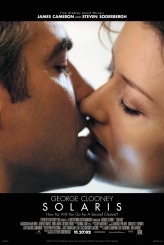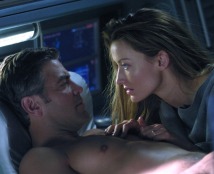|
Solaris
|
| |
 |
USA, 2002. Rated PG-13. 99 minutes.
Cast:
George Clooney, Natascha McElhone, Jeremy Davies, Viola Davis, Ulrich
Tukur, Morgan Rusler
Writers: Steven Soderbergh, based on the novel by Stanislaw Lem
Music: Cliff Martinez
Cinematographer: Steven Soderbergh (as "Peter Andrews")
Producers: James Cameron, Jon Landau, Rae Sanchini
Director: Steven Soderbergh
LINKS
|
"The marble pillars supporting the High Altar, pitch black at a distance,
reveal themselves on closer examination to be densely studded with fossilized
ammonites..."
--- Durham Cathedral
guide
"God is in the details."
---Mies van
der Rohe
 olaris
is that infrequent kind of movie that will have viewers either scratching their
heads or fervently debating its meaning on leaving the theater. As with Rohe
and Durham's medieval craftsmen, it is in the details that more profound elements
are revealed. Ostensibly, the film follows Chris Kelvin (George Clooney), a
widowed psychologist summoned aboard a space station to investigate a series
of deaths and the mental malaise of the remaining crew. To his initial horror,
shortly after boarding, Chris finds his deceased wife alive and apparently well.
olaris
is that infrequent kind of movie that will have viewers either scratching their
heads or fervently debating its meaning on leaving the theater. As with Rohe
and Durham's medieval craftsmen, it is in the details that more profound elements
are revealed. Ostensibly, the film follows Chris Kelvin (George Clooney), a
widowed psychologist summoned aboard a space station to investigate a series
of deaths and the mental malaise of the remaining crew. To his initial horror,
shortly after boarding, Chris finds his deceased wife alive and apparently well.
In remaking Russian director Andrei Tarkovsky's 1972 version of Stanislaw Lem's
book, Steven Soderbergh--as screenwriter, pseudonymous cinematographer, director,
and editor--posits the question "Are we doomed to play out the same trajectory
in a relationship given another chance?" With his unshakable belief in psychoanalysis,
Chris believes not.
Except it's not as simple as that, as the crew (Jeremy Davies and Viola Davis)
tries to persuade him. While studying the planet Solaris, similar experiences
plague their time on board, precipitating trauma and depression. As they orbit
the ethereal Solaris, confusion abounds. Seemingly compos mentis, his
reincarnate inamorata, Rheya (Natascha McElhone, FearDotCom, Ronin),
remembers scant details of their previous life, and is bafflingly possessed
of the inner peace that eluded her on earth and led to her suicide. On learning
of the crew's experiences, she suggests to Chris that she is now merely a projection
of his memory of her earthly self, and that his preconceptions of her suicidal
predilections will doom any rekindling of their relationship. This neat twist
on "physician, heal thyself," requiring a reversal of their married roles, is
one of several Biblical references in the film. Most notable--visually--are
echoes of Michelangelo's The Creation of Adam towards the denouement,
and intermittent shots of Solaris, rendered as tendrils of vapor, contextually
become suggestive of a heaven.  Only
when Rheya is resurrected for the third time does Chris begin to suspend his
logician's disbelief and develop something akin to faith.
Only
when Rheya is resurrected for the third time does Chris begin to suspend his
logician's disbelief and develop something akin to faith.
Once again, Soderbergh employs his familiar directorial style, using a non-linear
timelines to flashback to Rheya and Chris' earlier relationship, including her
suicide. This adds much needed depth to what may otherwise have been too straightforward
a narrative to hold and stimulate audiences' interest. The prolonged shots of
Clooney's naked rear may hold and even stimulate the interest of some, but as
Soderbergh's second choice for the part (Daniel Day-Lewis is rumored to have
turned the role down) Clooney's limitations here in a psychologically challenging
role are equally exposed. "It's not something that I'm known for, not something
that I've been asked to do in films," he says--of his acting ability--and there
is probably a reason for that. Ultimately, despite his character having to grapple
an overwhelming situation fraught with philosophical and psychological resonance,
his bankable star-quality (combined with sure-fire storytelling from Soderbergh)
covers up his inability to deeply render the complexities of his character.
The supporting cast, however, is uniformly excellent. The statuesque McElhone
is possessed of an otherworldliness that works equally well in conveying her
repressed neuroses on earth as it does her ambiguity in outer space. Jeremy
(Saving Private
Ryan, Secretary) Davies' oddball tics eventually
reveal themselves to be more than actorly mannerisms. Soderbergh-veteran and
Tony Award-winner Viola Davis (Far From Heaven, Traffic,
Out of Sight) excels in her one big scene, and while largely a foil for
Clooney in moving the plot along, is solid as the last, barely sane member of
the crew.
But the film is truly Soderbergh's. Reinforcing the isolation that the crew
feels, the characters rarely share a frame, and much of the dialogue captures
the inability of the characters to understand each other, themselves, or their
situation. Yet, even in the confused, clinical environment of the ship there
appears to emanate amniotic warmth, enhanced by the unobtrusive score. This
is particularly pronounced during Chris' amphetamine-driven delirium, which
in six dialog-free minutes provokes many questions.
Creditably though, despite being a major studio production, the film neither
doglegs into Hollywood schmaltz, nor try to definitively provide answers to
the questions Soderbergh seems to ask. Solaris juxtaposes the psychological
and the theophanic, suffusing the film with fleeting Judaeo-Christian references
that counterbalance Chris' trust in the psychoanalytic. Are we doomed
to play out the same trajectory in a relationship given another chance? Emitting
a primal scream in the face of his incomprehensible situation, Chris ultimately
appears to cede his rationalism, accepting that we are subject to the will of
a higher power. Is Soderbergh suggesting that faith triumphs over reason, or
is he reiterating the question Lem's 1961 book posed, "Can we truly understand
the universe around us without first understanding what lies within?"
Of his films, Soderbergh has said, "I'm comfortable with people leaving the
cinema not knowing what happened." In these terms, it is hard to imagine that
Soderbergh could find himself any more comfortable after the release of the
thought-provoking Solaris.
Review
© December 2002 by AboutFilm.Com and the author.
Images © 2002 Twentieth Century Fox Corp. and related entities. All Rights
Reserved.

 Only
when Rheya is resurrected for the third time does Chris begin to suspend his
logician's disbelief and develop something akin to faith.
Only
when Rheya is resurrected for the third time does Chris begin to suspend his
logician's disbelief and develop something akin to faith.
